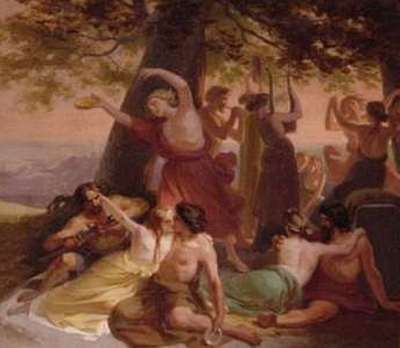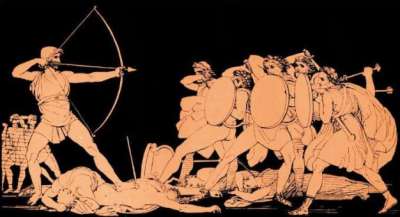
Ancient Athens public scene – during and even after its Pentecontaetia – was quite accustomed to display, beside those citizens in charge of specific institutional assignments and public servants who were performing minor duties to maintain the regular functioning of the polis bureaucratic machine, also highly powerful men who, in force of their rhetorical skills and perspicacious inclination were able to steer de facto the assembly in order to pursue their political, and often also personal, needs. These rhetors however, in spite of their undeniable actual influence, could not formally be held liable for their political conduct: as they could not be truly considered as belonging – and consequently acting – within a proper administrative body. Thus their behaviour in other fields than political and under distinct circumstances was continuously under screening as their political opponents were constantly seeking for occasions to take them to court with accusations of corruption and/or high treason to the democratic foundation of the polis.
One interesting instance is given by Demosthenes’ own defence against a bribing accusal, where the orator outlines his own ideas about duties and rights of a rhetor:
But for what is he responsible? For discerning the trend of events at the outset, for forecasting results, for warning others. That I have always done. Further, he ought to reduce to a minimum those delays and hesitations, those fits of ignorance and quarrelsomeness, which are the natural and inevitable failings of all free states, and on the other hand to promote unanimity and friendliness, and whatever impels a man to do his duty. All that also I have made my business: and herein no man can find any delinquency on my part.
Nonetheless it is perfectly clear how even in those days the greatest interests – both measured in terms of power and economics – that amply overcame the administration of the state. It is remarkably modern the widely recognised presence of full-time politicians, whose resources (mental and financial) were put at the service of the cause – although it is/was worth wondering which and whose cause… As Aeschines, his legendary rival, drily deplores Demosthenes’ attitude:
And you blame me if I come before the people, not constantly, but only at intervals. And you imagine that your bearers fail to detect you in thus making a demand which is no outgrowth of democracy, but borrowed from another form of government. For in oligarchies it is not he who wishes, but he who is in authority, that addresses the people; whereas in democracies he speaks who chooses, and whenever it seems to him good. And the fact that a man speaks only at intervals marks him as a man who takes part in politics because of the call of the hour, and for the common good; whereas to leave no day without its speech, is the mark of a man who is making a trade of it, and talking for pay.
Thus it was widely acknowledged – and to a certain extent accepted – that professional politicians, being them elected strategos or authoritative rhetors, benefited of their institutional roles and political prerogatives. Nonetheless what was considered ignominious and therefore harshly persecuted was the favouring of personal pursuits preferred to the welfare of the state, causing any possible impairment of the polis. Something quite bluntly stated by Hypereides when accusing Demosthenes of corruption:
For just I said in the Assembly, you members of the jury willingly give to the generals and speakers great scope for profit-making: it is not the laws which allow it, but your mildness and generosity. There is just one proviso you are worried about: what they take must be in and not against your interests. Now Demosthenes and Demades have each pocketed more than sixty talents from the actual decrees and proxenies – to say nothing of the King’s money and what came from Alexander…
These scandals, accusal and the following trials were particularly intriguing and captivated the attention of laymen and average people who were always looking for news and gossip. The truth is that since after Pericles death, a low profile Athenian political class took over: demagogues without any political background, personal dignity and scruples. A plain-spoken dialogue sets a briskly effective example of how despised in Athens in 424 b.C. were immoral party-leaders. Like Cleon that Aristophanes masks on stage as a Paphlagonian chesty and ruffian slave defeated in winning his master’s consideration by an untalented sausage seller: a mere simpleton strongly supported by all the other servants that unanimously detest Paphlagon.
Servant: Oh! the fool! Your tripe! Do you see these tiers of people? [pointing at the audience]
Sausage-Seller: Yes.
Servant: You shall be master to them all, governor of the market, of the harbours, of the Pnyx; you shall trample the Senate under foot, be able to cashier the generals, load them with fetters, throw them into gaol, and you will fornicate in the Prytaneum.
Sausage-Seller: What! I?
Servant: You, without a doubt. But you do not yet see all the glory awaiting you. Stand on your basket and look at all the islands that surround Athens.
Sausage-Seller: I see them. What then?
Servant: Look at the storehouses and the shipping.
Sausage-Seller: Yes, I am looking.
Servant: Exists there a mortal more blest than you? Furthermore, turn your right eye towards Caria and your left toward Carthage!
Sausage-Seller: Then it’s a blessing to be cock-eyed!
Servant: No, but you are the one who is going to trade away all this. According to the oracle you must become the greatest of men.
Sausage-Seller: Just tell me how a sausage-seller can become a great man.
Servant: That is precisely why you will be great, because you are a sad rascal without shame, no better than a common market rogue.
Sausage-Seller: I do not hold myself worthy of wielding power.
Servant: Oh! by the gods! Why do you not hold yourself worthy? Have you then such a good opinion of yourself? Come, are you of honest parentage?
Sausage-Seller: By the gods! No! of very bad indeed.
Servant: Spoilt child of fortune, everything fits together to ensure your greatness.
Sausage-Seller: But I have not had the least education. I can only read, and that very badly.
Servant: That is what may stand in your way, almost knowing how to read. A demagogue must be neither an educated nor an honest man; he has to be an ignoramus and a rogue. But do not, do not let go this gift, which the oracle promises.
Sausage-Seller: But what does the oracle say?
Servant: Faith, it is put together in very fine enigmatical style, as elegant as it is clear: “When the eagle-tanner with the hooked claws shall seize a stupid dragon, a blood-sucker, it will be an end to the hot Paphlagonian pickled garlic. The god grants great glory to the sausage-sellers unless they prefer to sell their wares.”
Sausage-Seller: In what way does this concern me? Please instruct my ignorance.
Servant: The eagle-tanner is the Paphlagonian.
Sausage-Seller: What do the hooked claws mean?
Servant: It means to say, that he robs and pillages us with his claw-like hands.
Sausage-Seller: And the dragon?
Servant: That is quite clear. The dragon is long and so also is the sausage; the sausage like the dragon is a drinker of blood. Therefore the oracle says, that the dragon will triumph over the eagle-tanner, if he does not let himself be cajoled with words.
Sausage-Seller: The oracles of the gods flatter me! Faith! I do not at all understand how I can be capable of governing the people.
Servant: Nothing simpler. Continue your trade. Mix and knead together all the state business as you do for your sausages. To win the people, always cook them some savoury that pleases them. Besides, you possess all the attributes of a demagogue; a screeching, horrible voice, a perverse, cross-grained nature and the language of the market-place. In you all is united which is needful for governing. The oracles are in your favour, even including that of Delphi. Come, take a chaplet, offer a libation to the god of Stupidity and take care to fight vigorously.
Aristophanes most certainly depicts a harsh and unequivocal characterisation of lowly origins, scarce culture and base merchandiser attitude rabble-rousers. This deep rooted detestation against any demagog unquestionably created an insurmountable barrier between public life and private life. More and more citizens, disgusted by the behaviours, greed and hypocrisy of rich merchants transformed overnight into politicians, meekly left all those decisional occasions go astray and thus letting the polis become an easy prey of those few avid talentless ignorants disguised as political leaders: something that undoubtedly compromised what best was of Western civilisation at the time…. Does any bell ring?


